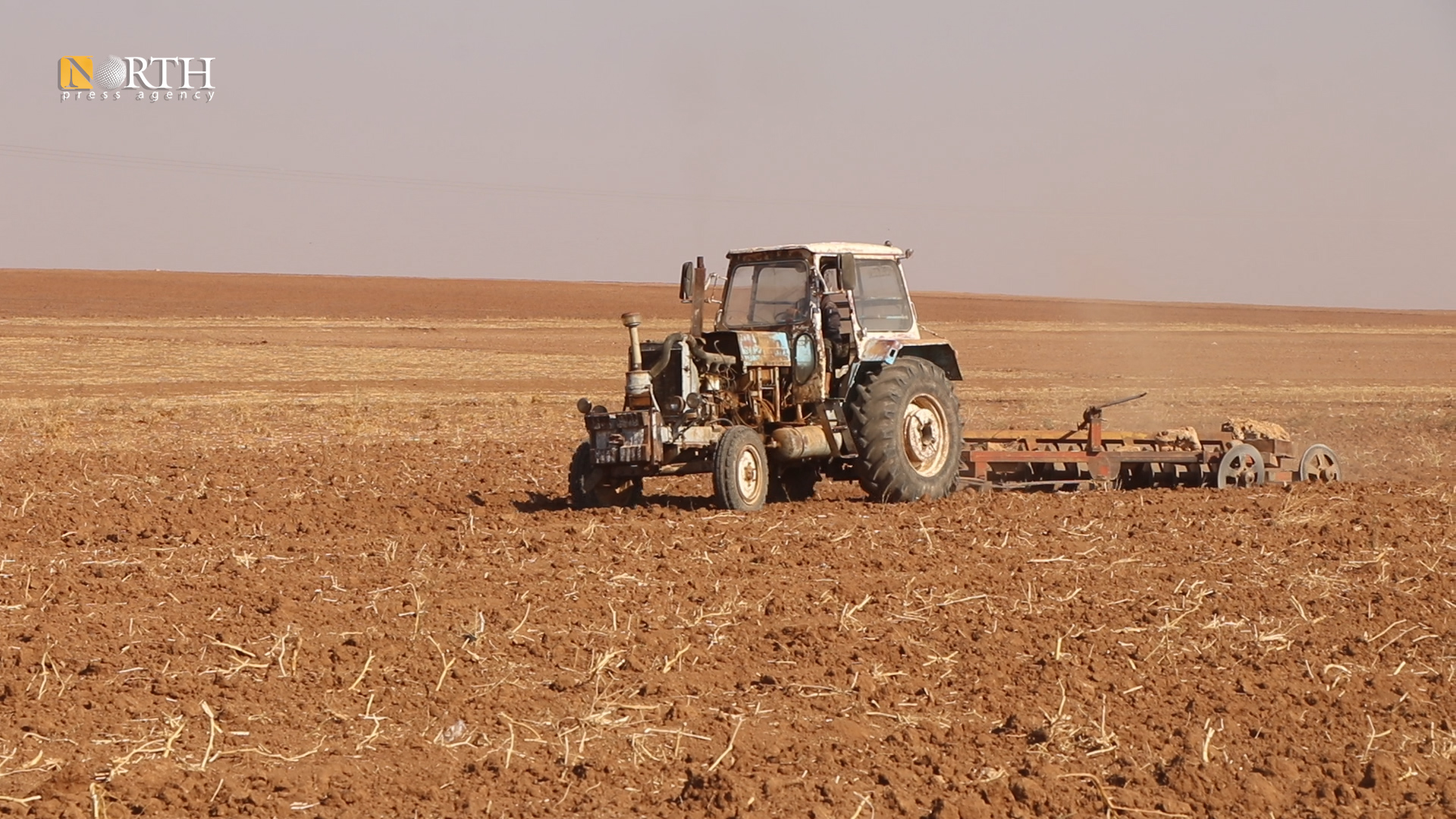HASAKAH COUNTRYSIDE, Syria (North Press) – Kaniwar Majdal, a 30-year-old farmer from Derbasiyah town, north of Hasakah, northeast Syria, is staring desperately at his agricultural land he had planted with wheat as the rainfall has delayed.
This year, Majdal expects a disaster harvesting season the same as the year before because of the lack of rain and his aimless efforts to get his portion from diesel that allow him operate the well to water his land.
Farmers in northeast Syria have major concerns this year will be as dry as the year before and the harvest will be damaged again adding new material loss on them.
The shortage of distributing farmers’ portions of diesel, seeds and fertilizers by the Agricultural Committee of the Autonomous Administration of North and East Syria (AANES) may be the key challenge the farmers face.
“A new desiccated year looms, yet we started to grow different types of crops. We have not received any promises to get fuels so far and this constitutes a great loss for us,” Majdal said while dust covering his costume.
The AANES supports the farmers with diesel for cheap prices (75 SYP per liter). However, the delay in distributing fuel and their shortage of amounts prompted many farmers to buy diesel from the black market to facilitate their work.
As for Majdal, he planted wheat seeds in 1,800 acres and bought 90% of the needed amount of fuel from the black market to drive his tractor. He only got 1,000 liter from the Agricultural Committee.
Majdal paid 410 SYP for each liter of diesel to be able to water the wheat, beans, coriander and fenugreek he planted.
A disaster season
The high-priced fuel, the high cost of manpower and tractors are all challenges the farmers have to face, according to Majdal.
“The farmers should be supplied with fuel by the end of next month, otherwise we will have a catastrophe,” Majdal added.
Last year, the Jazira region also known as Syria’s food basket provided main crops such as wheat and barley less than last year due to the poor rainfall and the Euphrates’ low level of water as a result of Turkish government diminishing the flow of water into the Syrian lands.
Fearing a harvest similar to the year before has become the talk of the town.
Saleh Ma’me, co-chair of Derbasiyah-based Agriculture Committee and Livestock, attributed the delay and shortage of distributing cultivation supplies to the great demand on the center given the last year’s drought.
Ma’me said, this year the Committee permitted many farmers to dig wells. The increased number of wells and the shortage of fuel as well as the size of cultivated lands are not commensurate.
1,700 wells this year are expected to be dug while 1,500 wells were dug last year, according to Ma’me.
The lands planted with wheat are expected to exceed 350,000 acres this season in Derbasiyah, Ma’me stated.
Few amounts
The Agriculture Committee and Livestock in Derbasiyah distributes an average of 4,500 tons of seeds each year, but this year only 1,100 tons were distributed which only covers 20% of the cultivated lands, according to Ma’me.
“The amount of wheat seeds in the warehouses do not fill the needs of all farmers,” Salman Barudo, co-chair of the AANES Agriculture and Economy Board said earlier.
“The Board prepared 34,000 tons of wheat seeds,” he added.
The Autonomous Administration fixed the price of one kilo of wheat seeds at 1,200 SYP.
In the black market, it was sold for 1,200 SYP at the beginning of 2021 but it hiked to 1,700 SYP per kilo.
On November 11, the United States Agency for International Development (USAID) announced it sent approximately 3,000 tons of wheat seeds to northeast Syria.
The amount sent is welcomed but unfortunately does not fill the gap, according to Barudo.
35,000 tons of wheat seeds were distributed on the farmers but the real needs amounts to 50,000 tons, Barudo noted.
Source of income
Eight kilometers south of Derbasiyah lies Muhammad Fandi’s farmland planted with wheat and coriander.
“This season a harvest failure looms,” Fandi said.
He claimed that he and many other farmers bought all cultivation supplies from the black market given they did not receive designated portions of seeds, fuel or fertilizer.
The farmers in Derbasiyah demand the Agriculture Board to provide them with cultivation supplies because buying all of them from the black market is a great loss.
Saleh Ma’me said the farmers have the legitimate right to demand their portions but the amount we have is little and is distributed according to the potentials.
The major constraint the farmers have to cope with this season is the shortage of fertilizer in the warehouses. Buying it from the black market is the only solution left.
The Agriculture Committee sell one ton of fertilizer at $500, the cost it says of import and transportation.
“Planting has a specific time, so the needed supplies should be given as soon as possible or we will lose our source of income,” farmers said.

